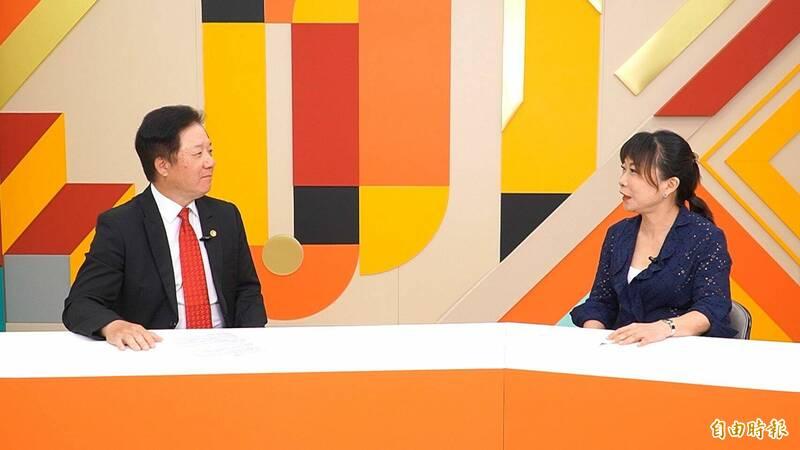Chunghwa Telecom Co (中華電信), the nation’s biggest telecom, has negotiated exclusive agency operation rights for major low-orbit satellites, the company’s chairman said today.
Through the agreements, the company could introduce Taiwanese firms into satellite supply chains and help build out the sector domestically, Chunghwa chairman Alex Chien (簡志誠) said in an interview with the Liberty Times (the Taipei Times' sister newspaper).
In addition to Chunghwa’s own ST-2 satellites, which are already in service, the company in April signed an agreement with US-based Astranis Space Technologies Corp for NT$4 billion (US$137.8 million) to build a third-generation compact geostationary orbit (MicroGEO) satellite, which would be Taiwan’s first exclusive communications satellite, he said.

Photo: Chang Chia-jui, Taipei Times
This satellite is considered a “sovereign satellite,” because Chunghwa would retain full ownership of it, including independent control and use of its full bandwidth, he said.
The goal is to retain communication security and autonomy in situations such as earthquakes or geopolitical crises, he said.
The satellite would launch at the end of this year and be in service by the second half of next year, he added.
The company is discussing satellite cooperation projects with countries in Northern Europe, Chien added.
Chunghwa has also signed a deal with Luxembourg-based SES SA, the only company in the world that operates medium Earth orbit satellites, Chien said.
The telecom has already applied for spectrum allocation from the Ministry of Digital Affairs and is awaiting approval from the National Communications Commission before launching its service, Chien said.
There are four low-orbit satellite companies in the world, but Chunghwa cannot work with one of them, Starlink, due to regulatory issues, Chien said.
Of the rest, Chunghwa has negotiated exclusive deals with Eutelsat OneWeb in the UK, the US' Kuiper Systems and Canada’s Telesat, Chien said.
Separately, to improve the resiliency of Taiwan’s international communication networks, Chunghwa aims to install seven new submarine cables and a landing station, Chien said.
The telecom at present operates seven cables and four landing stations, he added.
Two of the new cables are set to go online in the second half of this year, connecting Taiwan to Japan, Singapore and Hong Kong, and then another connecting Taiwan, Japan, Singapore and India, Chien said.
A new trans-Pacific fiber optic submarine cable, dubbed E2A, is set to go online in 2028, he added.
Taiwan also has nine domestic cables connecting its main island and outlying islands, Chien said, adding that a fourth cable between Taiwan, and Penghu, Kinmen and Lienchiang (Matsu) counties is under construction and expected to be completed next year.
The company is investing in new technologies in building these submarine cables, including artificial intelligence to ensure resiliency, he said.
The goal is to turn Taiwan into a regional hub for the communications industry, driving growth, job creation and the development of technology, Chien said.
In response to concerns about ships damaging submarine cables, the company has taken measures such as adding protective layers to them, burying them deeper underground and improving cooperation with the Coast Guard Administration, Chien said.

In Italy’s storied gold-making hubs, jewelers are reworking their designs to trim gold content as they race to blunt the effect of record prices and appeal to shoppers watching their budgets. Gold prices hit a record high on Thursday, surging near US$5,600 an ounce, more than double a year ago as geopolitical concerns and jitters over trade pushed investors toward the safe-haven asset. The rally is putting undue pressure on small artisans as they face mounting demands from customers, including international brands, to produce cheaper items, from signature pieces to wedding rings, according to interviews with four independent jewelers in Italy’s main

Japanese Prime Minister Sanae Takaichi has talked up the benefits of a weaker yen in a campaign speech, adopting a tone at odds with her finance ministry, which has refused to rule out any options to counter excessive foreign exchange volatility. Takaichi later softened her stance, saying she did not have a preference for the yen’s direction. “People say the weak yen is bad right now, but for export industries, it’s a major opportunity,” Takaichi said on Saturday at a rally for Liberal Democratic Party candidate Daishiro Yamagiwa in Kanagawa Prefecture ahead of a snap election on Sunday. “Whether it’s selling food or

CONCERNS: Tech companies investing in AI businesses that purchase their products have raised questions among investors that they are artificially propping up demand Nvidia Corp chief executive officer Jensen Huang (黃仁勳) on Saturday said that the company would be participating in OpenAI’s latest funding round, describing it as potentially “the largest investment we’ve ever made.” “We will invest a great deal of money,” Huang told reporters while visiting Taipei. “I believe in OpenAI. The work that they do is incredible. They’re one of the most consequential companies of our time.” Huang did not say exactly how much Nvidia might contribute, but described the investment as “huge.” “Let Sam announce how much he’s going to raise — it’s for him to decide,” Huang said, referring to OpenAI

The global server market is expected to grow 12.8 percent annually this year, with artificial intelligence (AI) servers projected to account for 16.5 percent, driven by continued investment in AI infrastructure by major cloud service providers (CSPs), market researcher TrendForce Corp (集邦科技) said yesterday. Global AI server shipments this year are expected to increase 28 percent year-on-year to more than 2.7 million units, driven by sustained demand from CSPs and government sovereign cloud projects, TrendForce analyst Frank Kung (龔明德) told the Taipei Times. Demand for GPU-based AI servers, including Nvidia Corp’s GB and Vera Rubin rack systems, is expected to remain high,